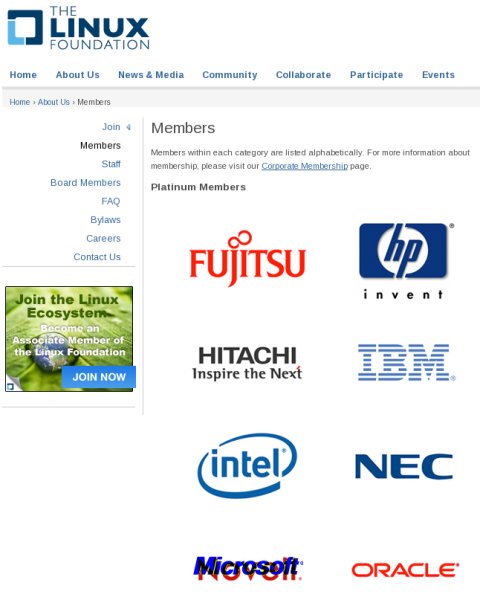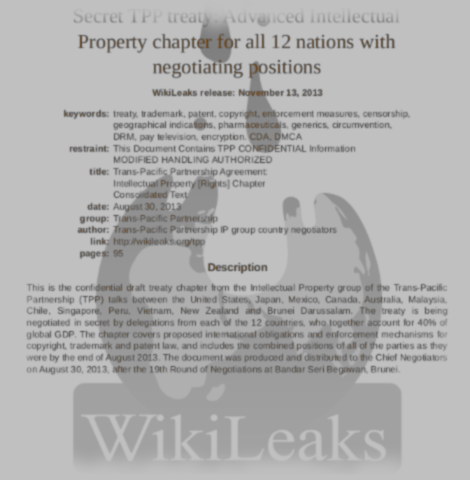11.14.13
Posted in News Roundup at 11:56 am by Dr. Roy Schestowitz
-
Florian Müllner had the pleasure of announcing that the first development release of the upcoming Polari IRC client for the GNOME 3.12 desktop environment is now available for download and testing.
-
-
-
-
-
If you want to set up a stripped down Ubuntu desktop, a clean approach is to first install Ubuntu server on your hardware, and then manually add desktop component to it.
-
It’s funny, when your home office is your couch, you tend to forget how nice it can be when you dock a laptop and have all the extra screen real estate a monitor brings. For many years, I left my work laptop docked at work, and when I worked from home, I just VPNed in with a personal laptop. Lately though, I’ve recognized the benefits of splitting personal life and work, so I’ve taken to carrying my laptop with me when I go to and from the office. Because we invested in a docking station, it’s relatively simple to transition between a laptop on my lap and a laptop on a desk with an extra monitor—except for one little thing: my external monitor is in portrait mode.
Permalink
 Send this to a friend
Send this to a friend
Posted in Free/Libre Software at 6:01 am by Dr. Roy Schestowitz
Spooks love the fog as it lets them spy on people without the people knowing about it

Summary: Looking at the problems with “cloud” (fog) computing, even when it is driven by Free software and is self-hosted
Fog Computing is one of the most disturbing emerging trends. It’s often proprietary by design (no access to source code) and it is a lot worse because it’s remotely controlled (no control over the binaries, either). Red Hat's embrace of OpenStack represents a strategic shift wherein Red Hat facilitates the deployment of Fog Computing by other companies [1]. It’s not Red Hat which does the violations, but oftentimes the companies which Red Hat helps will go on violating people’s privacy and dignity (Amazon for instance).
OpenStack is one of those cases where one has access to source code, but one cannot verify that this code is actually what’s executed as there is no access to the binaries (for the client side). Microsoft partners like Citrix are also embracing OpenStack [2], which sure enjoys growing influence [3]. It’s better to use something that’s Free/Open Source than something that’s proprietary, but when the code runs remotely, it is still far from freedom-respecting, unless of course it’s self-hosted, in which case NSA surveillance of OpenStack instances (possible [4]) is getting hard.
There is only one project that I know fulfills the above needs. It is the Germany-based OwnCloud [5,6,7], which has roots in SUSE (the key staff). The problem is, this project’s code has had a lot of vulnerabilities which basically would be easy for the NSA to exploit and gain access to servers. MEGA is said to be privacy-respecting, but it is proprietary and Flash-based. This option too has been found to have security vulnerabilities.
So the bottom line is this: keep your sensitive data on the local disk, stored by a reliable system like GNU/Linux. This data should not shipped without encryption (e.g. SSH) down a wire unless it only moved locally (within local network or hub). In this age of personal targeting, politically-motivated smears, espionage, etc. we need to protect our personal data. If we didn’t have anything to hide, we wouldn’t mind uploading our entire hard drives to be made publicly accessible by all, right? Well, not really. Apparently, even if you’re doing nothing wrong, you still need privacy. The NSA doesn’t give a damn about that. █
Related/contextual items from the news:
-
Red Hat has a sterling reputation for advancing and supporting Linux in the enterprise, but the company is structuring much of its future growth around cloud computing, and OpenStack in particular. The company has recently announced the Red Hat Enterprise Linux OpenStack Platform, an Infrastructure-as-a-Service certification program for OpenStack, a deepening partnership with Canonical and Ubuntu surrounding the new Havana release of OpenStack, and more.
-
VIDEO: The general manager of Citrix’s cloud efforts explains how his firm both supports and competes against the open-source OpenStack cloud.
-
The open-source OpenStack Foundation held its semiannual Design Summit here Nov. 5-8, discussing all manner of topics related to the cloud. As the first OpenStack Summit held outside of the United States, the event had a strong emphasis throughout on the global nature of the OpenStack cloud platform and, more specifically, the high levels of interest, participation and deployment of the platform in China. According to data released at the Hong Kong event, China is now home to more OpenStack developers than anywhere else in the world. China is also home to some of the largest OpenStack deployments on Earth, including one with Qihoo 360, a Beijing-based online security and mobile vendor. Qihoo 360 is using OpenStack to provide cloud-based security for 450 million user
-
The Edward Snowden revelations about NSA snooping in the cloud are not having an impact on OpenStack cloud vendors, including Rackspace and Dreamhost.
-
I recently covered the release of Dropbox platform and my thoughts on the impending cloud storage lock-in. I was also fortunate enough to run across what the guys over at NimbusBase are doing over the weekend. They seem to be the answer to the open API for mobile and web applications, providing a cross-cloud storage layer and a GPL reference implementation while they do it. I also penned a few thoughts on their model.
-
-
Permalink
 Send this to a friend
Send this to a friend
Posted in Free/Libre Software, GNU/Linux at 4:29 am by Dr. Roy Schestowitz

Hillsboro; Work by M.O. Stevens
Summary: Reports say that the Hillsboro School District is moving to GNU/Linux and other bits of news indicate growing realisation that in order to educate we must share freely and encourage sharing, too
“The financial reality of the education industry” is the title of a new article from OpenSource.com (Red Hat-run). It says [1] that “[h]igher education is not just about producing valuable workers, but about educating people to become thinking, lifelong learners who contribute in many positive ways to society, be that local or global.” In reality, however, based on emerging trends and disturbing new evidence, the schools system is about indoctrination and curriculum is set by those in power in order to help them keep power (or gain wealth). “Center for Copyright Information wants to introduce an anti-piracy curriculum to US schools,” says this new article [2], showing an utter abuse of this system. Contrariwise, in the Hillsboro School District, students are said to be shifting towards GNU/Linux [3] and OpenSource.com promotes the idea of free sharing of information in schools [4,5]. What’s education really about if not free dissemination of important knowledge? Where would schools be if every taught item needed to be “licensed”?
Looking at other areas of the public sector, OpenSource.com writes about Italy [6], South Africa ignores its own Free/Open Source software (FOSS) policies (doing a survey about it instead [7]), and economic advantages of moving the public sector to FOSS are discussed in relation to Ecuador [8] and Vietnam [9], whose economy is relatively weak and could benefit tremendously — in the savings and job creation sense — by moving to FOSS. Countries which teach young people how to use other countries’ software rather than how to develop new software or get involved in development of existing projects are just turning their future generation into clients, not producers. █
Related/contextual items from the news:
-
Higher education is not just about producing valuable workers, but about educating people to become thinking, lifelong learners who contribute in many positive ways to society, be that local or global.
-
COMMON LANGUAGE: Center for Copyright Information wants to introduce an anti-piracy curriculum to US schools.
When it comes to learning about the evils of internet piracy, Hollywood studios and the major music labels want kids to start young.
A nonprofit group called the Center for Copyright Information has commissioned a school curriculum to teach primary-age children about the value of copyrights.
-
The taxpayers have spoken: the Hillsboro School District might need faster computers, but it’s not going to buy them by increasing residents’ property tax bills with yet another bond measure.
The district’s five-year, $25 million bond failed during the Nov. 5 election, with 54 percent of voters rejecting the measure.
So the district is going to have to find another way to provide students with technological opportunities without spending nearly as much. There may be a solution that could speed up the computers, and the best part is that it is free: Ubuntu, an open-source Linux operating system.
-
-
The debate over purpose is whether online material is primarily a financial tool to create new revenue streams by video recording lectures to reach distance and nontraditional students or an opportunity to systemically restructure the substance and nature of higher education.
-
That said, every public body has the same freedom that any non-public body has in determining whether to acquire, develop, and release software under conditions of free and open source software. This is due to the fact that all public administrations in Italy are obliged to distribute to any other public administration all software which has been developed by or for them, in source code and without any charges (called the Reuse Rule). This fits perfectly in an all-free software workflow, where distribution under the Reuse Rule is not restricted to the Italian public administrations, but is public, to everybody.
-
The Department of Public Service and Administration (DPSA) is conducting an impact assessment on the implementation of its free and open source software (FOSS) policy.
-
Here’s a development that could have enormous global implications for the search for a new commons-based economic paradigm. Working with an academic partner, the Government of Ecuador has launched a major strategic research project to “fundamentally re-imagine Ecuador” based on the principles of open networks, peer production, and commoning.
-
Vietnam’s ministries, provincial administrations and municipalities are turning to free and open source, building on European examples, policies and concrete software solutions. To intensify collaboration, a Vietnamese delegation, including representatives from the Ministry of Science & Technology, universities and free software firms, met with the European Commission’s ISA Programme last month.
Permalink
 Send this to a friend
Send this to a friend
Posted in Microsoft, Mono at 4:10 am by Dr. Roy Schestowitz
Microsoft’s mole in the GNU/Linux world

Summary: Xamarin climbs up to Ballmer’s bed again, showing everyone that Mono is everything to do with Microsoft, not FOSS
OVER THE years the Mono project got closer and closer to Microsoft, up to the point where Mono code was from Microsoft itself, bearing Microsoft software licences. The funding behind Mono was tied to Microsoft, too. That’s just the tip of the iceberg and there is a lot more in our Wiki pages about Xamarin and the Microsoft MVP Miguel de Icaza. Based on articles from all the usual suspects (those who regularly give Mono some coverage), .NET lock-in is “cross-platform” (Paul Krill says so) and also, “Xamarin, the company driving the development of the Mono open-source .NET framework that is generally loved or hated by Phoronix readers, has announced a new partnership with Microsoft.”
Microsoft’s booster Peter Bright is already doing some public relations for his beloved Microsoft and other Microsoft circles seem to care about this more than GNU/Linux-oriented sites.
“De Icaza endorsed Microsoft’s Office Open XML (OOXML) document standard…”
–WikipediaMono is a Microsoft pet project. It is worth noting that Gnote, which replaces a Mono project that infected GNOME-based distributions, is almost superseding it now [1], so Mono seems to be on its way out of the GNU/Linux world.
According to Wikipedia, “De Icaza endorsed Microsoft’s Office Open XML (OOXML) document standard,[11][12][13] disagreeing with a lot of the widespread criticism in the open source and free software community.
“He has also been a longtime advocate of using Mono – a free software implementation of Microsoft’s .NET Framework – in GNOME.[14] This has raised much disagreement due to the patents that Microsoft holds on, and related to, the .NET Framework.
“For advocating Microsoft technologies, de Icaza was criticized by Richard Stallman on the Software Freedom Day 2009 as “Traitor to the Free Software Community”.” █
Related/contextual items from the news:
-
The GNOME developers announced a few days ago the immediate availability for download and testing of the first development release towards the Gnote 3.12 application.
Permalink
 Send this to a friend
Send this to a friend
Posted in Action at 3:52 am by Dr. Roy Schestowitz
Photo by Sebastian Widmann (AFP)

Abducted by the CIA in Germany, tortured, threatened with death, found to be innocent (background)
Summary: The growing concern about secret torture which is increasingly being used as a weapon against dissent in the US
IN RECENT years, as daily links in Techrights became a little more ‘political’ (not right versus left), the subject of torture was frequently alluded to or fully covered. Torture — like slavery — is not gone from this world. It just morphed a little.
We wish to draw readers’ attention to the development of new torture techniques by the United States [1]. Yesterday was Guantánamo’s 12th anniversary and as someone who is high up reminds us [2], “[o]ut of 779 detainees, only seven have been convicted and sentenced,” so we know it’s not a matter of torturing the guilty. To make matters worse, the CIA was torturing people right here in Europe and now that there is political scrutiny they seek secrecy [3]. Johnson, one of the activists against the NDAA (which makes the same rules applicable to US citizens), says [5] that the “loaded gun pointed at Afghanistan,” combined with the NDAA, “was the same gun pointed at the United States.” Notable people in the US seem to become more politically aware and some quit their job because of it [6].
Today, committing a minor crime can lead to small retribution [6], but some day in the future it may also lead to assassination by drone, indefinite detainment, and torture. It’s now pretty much legal to do all these things to US citizens too )on US soil too), so citizens need to rise up and do something about it. █
Related/contextual items from the news:
-
-
Out of 779 detainees, only seven have been convicted and sentenced. The US must end this costly disgrace
-
Poland’s government has asked the European Court of Human Rights to exclude the media and the public from a court hearing on whether Poland hosted a secret CIA prison on its territory.
The request for a private hearing was criticised by a Polish human rights group, which accuses the state of trying to conceal its involvement in the CIA’s “extraordinary rendition” programme behind a veil of secrecy.
-
Likening the Authorization for Military Use of Force Against Terrorists as a loaded gun pointed at Afghanistan, Johnson said the NDAA was the same gun pointed at the United States.
-
The AP notes that Moffit’s worldview changed after reading the works of the Dalai Lama and Chomsky over the last few years while in school.
-
People like Luis Rivera are being locked out of the formal workforce forever thanks to one youthful mistake.
Permalink
 Send this to a friend
Send this to a friend
Posted in Kernel, Microsoft, Virtualisation, VMware at 3:27 am by Dr. Roy Schestowitz

Summary: Nicolas (Neela) Jacques is appointed by the Linux Foundation to be Executive Director, overseeing efforts that involve GNU/Linux vendors
MICROSOFT ENTRYISM is a serious problem. We already know what impact it has had on Yahoo! and Nokia. Microsoft also occupied VMware after EMC’s Tucci foolishly let Ballmer do this (almost all the top executives were Microsoft executives bringing in former colleagues). The Ubuntu project too is now steered by a former Microsoft employee (who still lives in Seattle, just like Elop) as the project angers more and more people [1, 2].
Among the VMware managers who are former Microsoft employees there is this guy who, after the Linux Foundation let Microsoft get closer (to OpenDaylight), becomes the Executive Director. “Until now, the OpenDaylight Project has not had its own Executive Director, but that has changed,” says this article. So now we have a former Microsoft manager in charge of a Linux Foundation initiative. Wonderful! What could possibly go wrong? █
Permalink
 Send this to a friend
Send this to a friend
11.13.13
Posted in Intellectual Monopoly at 11:20 am by Dr. Roy Schestowitz
Thank you, Wikileaks

Summary: Learning what the Trans-Pacific Partnership (TPP) is about (basically a corporate land grab of global scale) is now possible
A FEW months ago, the victims of TPP (who are over 99% of the world’s population) got hold of the leaked file from TPP negotiations, Wikileaks-secret-TPP-treaty-IP-chapter.pdf. Like Cablegate before it, this leak shows serious corruption. It shows how corporations are capturing political systems all around the world in order to provide themselves with protectionism. Glyn Moody told me a few hours ago: “it would be great to get this out to your networks – http://keionline.org/node/1825 they don’t want people to know what’s in TPP…”
Here some shorter analysis from KEI for those who haven’t time to read the whole thing. For the uninitiated, here is a video where Noam Chomsky explains what TPP is about. We’ll continue to post links about TPP and urge readers to fight TPP like a plague. █
Permalink
 Send this to a friend
Send this to a friend
Posted in GNU/Linux, Kernel, Tivoization at 11:07 am by Dr. Roy Schestowitz

Summary: Linux gets injected into it some code that potentially ties software to hardware (in the lock-in sense)
Based on antitrust exhibits, Intel’s relationship with Microsoft is complex, but Intel generally uses Windows to keep the Wintel cash cow going. Earlier this year I spoke to Intel employees who run the UEFI Forum (a forum decorated by some more members who help distract from the real dominating force) and I tried to be polite and constructive, advising the head of this forum to withdraw ‘secure’ boot. I didn’t bring up the fact that his employer, Intel, is a criminal company whose former staff plays a big role in parasites like Intellectual Ventures. I just pointed out that my brother in law works for Intel and that perhaps Intel can be changed for the better. But that was too optimistic. The utter mess which is UEFI ‘secure’ boot (harming hardware, not just computing freedom) goes forth and despite the fact that it is bricking devices with Windows on them (apparently things are getting even worse [1]), Linux developers let that nonsense enter the kernel, specifically for ARM [2], where so-called ‘secure’ boot cannot even be disabled.
“This is like another Tivoization taking place and Linux Torvalds, who spoke out against UEFI ‘secure’ boot, will probably just find some excuses for letting it be.”This is probably happening because Intel funds the Linux Foundation. UEFI Forum is Intel is Linux Foundation (in part). That’s how the influence of money works. This is like another Tivoization taking place and Linux Torvalds, who spoke out against UEFI ‘secure’ boot, will probably just find some excuses for letting it be. The situation is similar when it comes to the W3C (Linux Foundation equivalent), where corporate members (like Intel/UEFI Forum) push DRM into the Web while the founder, Tim Berners-Lee, just lets it be, essentially forcing everyone to just swallow the poison, even good forces like Eich/Mozilla [3].
The head of the UEFI Forum mocked or at least dismissed DRM as just for “business models”, but his employer promotes DRM. UEFI ‘secure’ boot — like DRM — is just about business models, so who is he kidding? Likewise, Berners-Lee has many reasons to dislike DRM given his historical background (he created the Web to share his work), yet he keeps defending DRM right now [1, 2, 3]. Are these people thinking for themselves or are they all just blindly/reluctantly following orders of those who pay their salaries? Rather than protect copyright monopolies in their respective areas (which is why the monopolies try to use DRM on the Web) or protect the monopoly of software crooks (who use bribe and sabotage to hold back GNU/Linux) perhaps those influential people should make a brave stand and rise up against corporate takeover, spilling some beans or using public humiliation to drive away the lobbyists. █
Related/contextual items from the news:
-
And then, there’s the celebrated Microsoft update to convert your Windows 8 RT computer into a Windows 8.1 RT… brick! It went so bad that Microsoft had to prevent people from installing it.
I don’t know if they fixed it but, according to this post, the update to Win 8.1 now seems to convert your computer into a cat (because it does not play nicely with mice).
-
While EFI was originally developed by Intel and largely targeting x86 platforms, the EFI 2.3 specification does exist for Itanium and ARM architectures too and early this year the UEFI Forum had shown a proof-of-concept UEFI boot environment for ARMv8. With the EFI pull for the Linux 3.13 merge window, the Linux EFI support extends to ARM.
-
If I didn’t before, after talking to Eich I had a strong sense that Mozilla is constrained by conflicting desires – to do the right thing, for example, while retaining enough browser share that it remains able to do the right thing. As you might expect, there are no easy solutions. Fortunately, things seemed more hopeful regarding another topic we discussed: I’ll be exploring that in my next column.
Permalink
 Send this to a friend
Send this to a friend
« Previous Page — « Previous entries « Previous Page · Next Page » Next entries » — Next Page »

































 Content is available under CC-BY-SA
Content is available under CC-BY-SA